Opinion
In 1971, the movement that became Sojourners was born at an evangelical seminary, Trinity Evangelical Divinity School in Chicago. In 1973, Sojourners worked with Evangelicals for Social Action in a gathering Ron Sider convened, again in Chicago, which produced a document called the "Chicago Declaration of Evangelical Social Concern."

We are in the midst of a national trauma, with a vast number of women in America — across political lines — being re-traumatized by the events of last week. This moment requires pastoral care for survivors and those who love them, prophetic truth-telling about what is (or ought to be) morally acceptable and unacceptable, and the hope for some more profiles in courage in the United States Senate.

Donald Glover aka Childish Gambino has become a cultural icon. From his comedic work in Community to his acting in both Marvel and Star Wars franchises to his writing and producing of the critically acclaimed show Atlanta, the versatile Grammy-nominated artist is a creative force. Throughout all of this commercial and critical success, Donald Glover has refused to frame his work as a product; instead he wants to offer a participatory experience, a religious experience even.

Christianity transformed from a faith reliant on Jesus to a civic religion obsessed with obtaining partisan power. This co-opting of Jesus — manipulating His gospel of love and redemption to fit the narrative of an expanding American empire, specifically to maintain the colonial stronghold of white supremacy — fits a historical pattern.
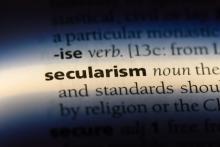
Some years ago, I was supervising a focus group of nonreligious Latinxs. The topic of the focus group was politics and religion. As the discussion progressed, someone meekly mentioned that they were not religious, apparently expecting the judgment of their fellow group members. But they were not judged. One by one, fellow group members surprised each other as they admitted that they were also not religious. They were unaware that there were others like them. Their experiences have been ignored by their ethnic communities and society at large because they do not fit the stereotype of the pious Latinx. Nevertheless, it’s important for religious people and the broader public to understand this particular group.

Thursday, Sen. Lindsay Graham (R-S.C.) changed the narrative from the weight of Dr. Christine Blasey Ford's compelling testimony to a matter of completely partisan loyalty against the Democrats, who of course had their own partisan motives. But the greatest blame, in my view, rests with Sen. Mitch McConnell (R-Ky.) who made the most partisan move in the history of Supreme Court nominations by refusing to even consider President Barack Obama's nomination of Merrick Garland for an entire year. That poisoned the Senate "well" for Supreme Court nominations in toxic ways.

When I realized that I’m not alone in my fears for my own safety as a woman, and as an Indigenous woman, I began to notice everything. I watch interactions between men and women more closely. This hyper-awareness is leaving many of my friends on edge across America, women who have now seen a man like Kavanaugh lauded for his work while his victim is called a liar. We don’t trust the people on the streets, in elevators, or in our neighborhoods. We are paying attention.
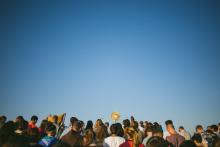
Twenty-seven years ago, as an African-American female clergy leader and legislative advocate, I operated in two worlds dominated by male power – religion and politics. I watched Anita Hill sit with the same quiet dignity as Rosa Parks resisting racial segregation on an Alabama bus by refusing to give up her seat to a white man. Rosa Parks went to jail. Anita Hill watched as Clarence Thomas was voted onto the U.S. Supreme Court. For both women, it looked like the dominion of male power had won.
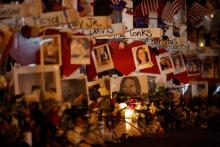
It is gut-wrenching to look at their faces — 58 of them. They were young, old, men, women, single, married, parents, and grandparents. From all over the country and from Canada, they had one thing in common: they were fans of country music. One year ago, on Oct. 1, they made their way to an open field in Las Vegas where, in the midst of their revelry, they were plunged into terror and cut down by bullets — more than 1100 — fired from 32 stories above their heads.

Women across the world have broken open, offering their stories of abuse and assault in a shared scream, searching for a new normal so our daughters and sons won’t have to deal with the same. The response we see from men in leadership has been a series of temper tantrums at the prospect of having to change learned behavior.

I slowly came to understand that if I was going to remain a Christian, I needed to find a path that had room for the rage and grief I carried with me as a rape survivor. Rage is the only human and rational reaction to the trauma I’d experienced, and I could not smother my humanity in order to remain a Christian. It was around this time that I first read The Autobiography of Malcolm X. This past Tuesday, after we read Martin & Malcolm & America by James Cone, my seminary professor asked “what elements of Malcolm’s theology could contribute to Christian theology?” and my answer was immediate: holding space for rage.

For America’s ruling class – the lawyers, judges, doctors, and other Ivy-League graduates who run many of the institutions who shape the fabric of American life, the witness of Christine Blasey Ford against Supreme Court nominee Brett Kavanaugh was a moment of reckoning. When it comes to the issues of power, privilege, and gender that shape our behavior every day, churches, once considered some of the most potent moral forces in American society, have been largely missing in action.
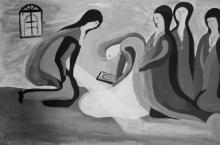
Christian leaders, on the whole, have failed to address the abuse and assault experienced by more than half of all Christian believers. When was the last time your congregation dedicated a sermon or service to sexual harassment, assault, and abuse? If you are fortunate enough to have experienced such a service, you’re the exception to the rule. Despite attending all sorts of churches within a variety of denominations and despite sitting through countless sermons, I have not once heard violence against women addressed in any significant capacity. I’ve heard homilies on the Leviathan, the Nephilim, and the dimensions of Noah’s ark. I have not heard a single sermon confronting a problem that affects nearly every woman in every congregation, and around the world
2. What Do Survivors Need to Hear Today?
Start here: “You are beloved.” “You will recover.” “God is with you.”
3. Blocking Poor Immigrants Could Be Very Costly
“Worse health outcomes, especially among pregnant women. A jump in emergency room usage. More communicable diseases. Higher poverty and housing instability, including among U.S. citizen children. Lower productivity. Reduced educational attainment. And ‘downstream and upstream impacts on state and local economies, large and small businesses, and individuals.’ What are all these terrible things? They’re all potential consequences of a new Department of Homeland Security (DHS) rule—according to DHS itself.”

On Thursday Dr. Christine Blasey Ford recounted her experience of sexual assault before a committee comprising mostly older white men. Women and other victims of abuse held their collective breath. The details were familiar. The resulting trauma — anxiety, fear of flying, claustrophobia — resonated. Survivors listened — and they recalled their worst experiences.
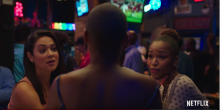
Much more than a depiction of self-imposed self-work, Nappily Ever After, directed by Haifaa Al-Mansour, challenges viewers to wholeheartedly release the things that chain them. It is a story about rejecting whom others say we are and celebrating the person we know ourselves to be.

As I look back, I can now see how these transitions had been significant in my caminata espiritual as well as in discerning my call to serve God and God’s people. These different encounters with places, peoples, and cultures, have been crucial in my attempt to foster the conditions for visible signs of Jesus’ kingdom to be a present reality and not only an eschatological affair.

In America’s children, we often see hope for a better future, especially when it comes to reducing racism. Each new generation of white people, the thinking goes, will naturally and inevitably be more open-minded and tolerant than previous ones. But do we have any reason to believe this? Should we have faith that today’s white kids will help make our society less racist and more equitable? Previous research has had mixed findings. So in order to explore more fully what white kids think about race, I went straight to the source: white children themselves.

For me, clerical sexual abuse is personal, professional, and institutional. It has haunted my service of the church for more than five decades, involving the abuse of people, power, and trust and a clerical culture that enabled it and covered it up. My experiences have taught me several lessons that I believe will be helpful as the church moves forward.

Women have the right to live free from violation to their bodies. There is nothing profound about this statement. I want to believe it holds no hint of hyperbole, that this is a commonly held belief, that it is in fact true But in light of the rhetoric circulating in recent weeks, I’m not so sure.